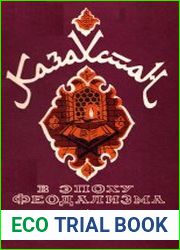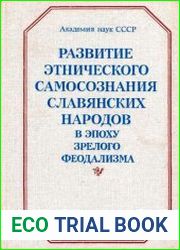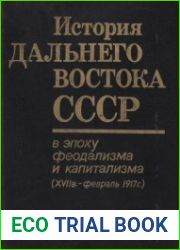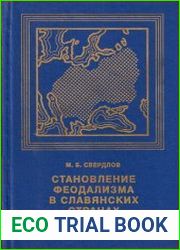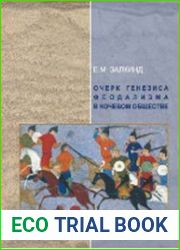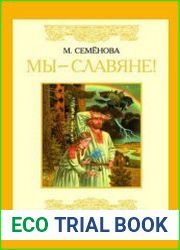
BOOKS - HISTORY - Славяне в эпоху феодализма

Славяне в эпоху феодализма
Author: Черепнин Л.В. (отв. ред.)
Year: 1978
Pages: 350
Format: PDF
File size: 10.6 MB
Language: RU

Year: 1978
Pages: 350
Format: PDF
File size: 10.6 MB
Language: RU

The plot of the book 'Славяне в эпоху феодализма' revolves around the scientific and pedagogical activities of VI Picheta, one of the founders and first heads of the Department of History of the Southern and Western Slavs at Moscow State University. The book explores the history of Slavic countries during the era of feudalism, covering socio-economic history, political history, international relations, historiography, and cultural history. It features contributions from leading Soviet Slavists and is dedicated to the centenary of Picheta's birth and the VIII International Congress of Slavists. The book begins with an introduction to Picheta's life and work, highlighting his significant contributions to the field of Slavic studies. It then delves into the historical context of the era of feudalism, discussing the social, economic, and political structures that shaped the development of Slavic societies during this period. The book examines the various forms of feudalism that existed in different regions of Eastern Europe, including the nobility, the Church, and the peasantry, and how they impacted the lives of ordinary people. The next section of the book focuses on the cultural and intellectual achievements of the Slavic peoples during this time, including their literature, art, and architecture. It discusses the role of religion in shaping the culture and beliefs of the Slavs and how it influenced their daily lives.
сюжет книги 'Славяне в эпоху феодализма'вращается вокруг научных и педагогических действий VI Picheta, одного из основателей и первых глав Отдела Истории южных и Западных славян в Московском государственном университете. Книга исследует историю славянских стран в эпоху феодализма, охватывая социально-экономическую историю, политическую историю, международные отношения, историографию, историю культуры. В ней представлены материалы ведущих советских славистов, она посвящена столетию со дня рождения Пичеты и VIII Международному конгрессу славистов. Книга начинается с введения в жизнь и творчество Пичеты, подчёркивающего его значительный вклад в область славистики. Затем он углубляется в исторический контекст эпохи феодализма, обсуждая социальные, экономические и политические структуры, которые сформировали развитие славянских обществ в этот период. В книге рассматриваются различные формы феодализма, существовавшие в разных регионах Восточной Европы, включая дворянство, Церковь и крестьянство, и как они влияли на жизнь простых людей. Следующий раздел книги посвящен культурным и интеллектуальным достижениям славянских народов за это время, включая их литературу, искусство, архитектуру. В ней обсуждается роль религии в формировании культуры и верований славян и то, как она повлияла на их повседневную жизнь.
Histoire du livre « Slavyan à l'ère du féodalisme » tourne autour des actions scientifiques et pédagogiques de VI Picheta, l'un des fondateurs et les premiers chefs de la Division de l'Histoire des Slaves du Sud et de l'Ouest à l'Université d'État de Moscou. livre explore l'histoire des pays slaves à l'époque du féodalisme, couvrant l'histoire socioéconomique, l'histoire politique, les relations internationales, l'histoire, l'histoire culturelle. Il présente les documents des principaux slavistes soviétiques, il est dédié au centenaire de la naissance de Picheta et au VIII Congrès international des slaves. livre commence par une introduction à la vie et à la créativité de Picheta, soulignant sa contribution importante dans le domaine de la slave. Il se penche ensuite sur le contexte historique de l'ère féodale en discutant des structures sociales, économiques et politiques qui ont façonné le développement des sociétés slaves au cours de cette période. livre examine les différentes formes de féodalisme qui ont existé dans différentes régions de l'Europe de l'Est, y compris la noblesse, l'Église et la paysannerie, et comment elles ont influencé la vie des gens ordinaires. La section suivante du livre traite des réalisations culturelles et intellectuelles des peuples slaves au cours de cette période, y compris leur littérature, leur art, leur architecture. Il traite du rôle de la religion dans la formation de la culture et des croyances des Slaves et de la façon dont elle a influencé leur vie quotidienne.
la trama del libro 'eslavos en la era del feudalismo'gira en torno a la acción científica y pedagógica de VI Picheta, uno de los fundadores y primeros jefes del Departamento de Historia de los Eslavos del Sur y del Oeste en la Universidad Estatal de Moscú. libro explora la historia de los países eslavos durante la era del feudalismo, abarcando la historia socioeconómica, la historia política, las relaciones internacionales, la historiografía, la historia de la cultura. Cuenta con materiales de destacados eslavistas soviéticos, está dedicada al centenario del nacimiento de Picheta y al VIII Congreso Internacional de Eslavistas. libro comienza con una introducción a la vida y obra de Picheta, destacando su importante contribución al campo de la eslavística. Luego se profundiza en el contexto histórico de la época del feudalismo, discutiendo las estructuras sociales, económicas y políticas que formaron el desarrollo de las sociedades eslavas durante este período. libro examina las diferentes formas de feudalismo que existían en las diferentes regiones de del Este, incluyendo la nobleza, la Iglesia y el campesinado, y cómo afectaban a la vida de la gente común. La siguiente sección del libro trata sobre los logros culturales e intelectuales de los pueblos eslavos durante este tiempo, incluyendo su literatura, arte, arquitectura. Discute el papel de la religión en la formación de la cultura y las creencias de los eslavos y cómo ha influido en su vida cotidiana.
A história de «Slavos na era do feudalismo» gira em torno das ações científicas e pedagógicas da VI Pickheta, um dos fundadores e primeiros chefes do Departamento de História dos eslavos do Sul e do Oeste na Universidade Estatal de Moscou. O livro explora a história dos países eslavos na época do feudalismo, abrangendo a história social e econômica, a história política, as relações internacionais, a historiografia, a história cultural. Apresenta os principais eslavos soviéticos sobre o centenário do nascimento de Picheta e o VIII Congresso Internacional de Eslavos. O livro começa com a introdução e obra de Picheta, que enfatiza suas contribuições significativas para o campo da slavística. Depois, aprofundou-se no contexto histórico da era feudalista, discutindo as estruturas sociais, econômicas e políticas que formaram o desenvolvimento das sociedades eslavas durante este período. O livro aborda as diferentes formas de feudalismo que existiam em diferentes regiões da Oriental, incluindo a nobreza, a Igreja e os camponeses, e como eles influenciavam a vida das pessoas comuns. A próxima seção do livro trata das conquistas culturais e intelectuais dos povos eslavos, incluindo sua literatura, arte, arquitetura. Ele discute o papel da religião na formação da cultura e crenças dos eslavos e como ela influenciou a sua vida cotidiana.
la trama del libro «Slavi nell'era del feudalismo» ruota intorno alle azioni scientifiche e didattiche della VI Piccheta, uno dei fondatori e primi capi della Divisione di Storia delle Slave meridionali e occidentali all'Università Statale di Mosca. Il libro esplora la storia dei paesi slavi nell'era del feudalismo, coprendo storia socio-economica, storia politica, relazioni internazionali, storiografia, storia culturale. Presenta i contributi dei più importanti slavi sovietici, il centenario della nascita di Picheta e l'VIII Congresso Internazionale degli Slavi. Il libro inizia con l'introduzione nella vita e l'opera di Picheta, che sottolinea il suo notevole contributo nel campo della slavistica. approfondisce poi nel contesto storico dell'era del feudalismo, discutendo delle strutture sociali, economiche e politiche che hanno formato lo sviluppo delle società slave in questo periodo. Il libro affronta le diverse forme di feudalismo presenti in diverse regioni dell'orientale, tra cui la nobiltà, la Chiesa e la contadineria, e come hanno influenzato la vita della gente comune. La sezione successiva è dedicata ai progressi culturali e intellettuali dei popoli slavi in questo periodo, inclusa la loro letteratura, l'arte, l'architettura. discute del ruolo della religione nella formazione della cultura e delle credenze delle glorie e del modo in cui essa ha influenzato la loro vita quotidiana.
Die Handlung des Buches „Slawen im Zeitalter des Feudalismus“ dreht sich um die wissenschaftlichen und pädagogischen Aktionen von VI Picheta, einem der Gründer und ersten iter der Abteilung für Geschichte der Süd- und Westslawen an der Moskauer Staatlichen Universität. Das Buch untersucht die Geschichte der slawischen Länder im Zeitalter des Feudalismus und umfasst sozioökonomische Geschichte, politische Geschichte, internationale Beziehungen, Geschichtsschreibung und Kulturgeschichte. Es enthält Materialien führender sowjetischer Slavisten, es ist dem hundertsten Jahrestag der Geburt von Picheta und dem VIII. Internationalen Kongress der Slavisten gewidmet. Das Buch beginnt mit einer Einführung in Pichetas ben und Werk und betont seinen bedeutenden Beitrag auf dem Gebiet der Slawistik. Dann taucht er in den historischen Kontext der Epoche des Feudalismus ein und diskutiert die sozialen, wirtschaftlichen und politischen Strukturen, die die Entwicklung der slawischen Gesellschaften in dieser Zeit geprägt haben. Das Buch untersucht die verschiedenen Formen des Feudalismus, die in verschiedenen Regionen Osteuropas existierten, einschließlich des Adels, der Kirche und der Bauernschaft, und wie sie das ben der einfachen Menschen beeinflussten. Der nächste Abschnitt des Buches widmet sich den kulturellen und intellektuellen Errungenschaften der slawischen Völker in dieser Zeit, einschließlich ihrer Literatur, Kunst und Architektur. Es diskutiert die Rolle der Religion bei der Gestaltung der Kultur und des Glaubens der Slawen und wie sie ihr tägliches ben beeinflusst hat.
''
'feodalizm çağında Slavlar'kitabının konusu, Moskova Devlet Üniversitesi Güney ve Batı Slavları Tarihi Bölümü'nün kurucularından ve ilk başkanlarından biri olan VI Picheta'nın bilimsel ve pedagojik eylemleri etrafında dönüyor. Kitap, feodalizm döneminde Slav ülkelerinin tarihini, sosyo-ekonomik tarihi, siyasi tarihi, uluslararası ilişkileri, tarih yazımını ve kültürel tarihi kapsıyor. Önde gelen Sovyet Slavistlerinden materyaller sunar, Picheta'nın doğumunun yüzüncü yılına ve VIII. Uluslararası Slavistler Kongresi'ne adanmıştır. Kitap, Slav çalışmaları alanına yaptığı önemli katkıyı vurgulayan Picheta'nın yaşamına ve çalışmalarına bir giriş ile başlar. Daha sonra feodalizm döneminin tarihsel bağlamına giriyor ve bu dönemde Slav toplumlarının gelişimini şekillendiren sosyal, ekonomik ve politik yapıları tartışıyor. Kitap, soyluluk, Kilise ve köylülük de dahil olmak üzere Doğu Avrupa'nın farklı bölgelerinde var olan çeşitli feodalizm biçimlerini ve bunların sıradan insanların yaşamlarını nasıl etkilediğini incelemektedir. Kitabın bir sonraki bölümü, bu süre zarfında Slav halklarının edebiyat, sanat, mimari de dahil olmak üzere kültürel ve entelektüel başarılarına ayrılmıştır. Dinin Slavların kültür ve inançlarını şekillendirmedeki rolünü ve günlük yaşamlarını nasıl etkilediğini tartışıyor.
تدور حبكة كتاب «السلاف في عصر الإقطاع» حول الإجراءات العلمية والتربوية التي قام بها في بيتشيتا، أحد مؤسسي قسم تاريخ السلاف الجنوبيين والغربيين في جامعة موسكو الحكومية ورؤسائه الأوائل. يستكشف الكتاب تاريخ البلدان السلافية في عصر الإقطاع، ويغطي التاريخ الاجتماعي والاقتصادي والتاريخ السياسي والعلاقات الدولية والتأريخ والتاريخ الثقافي. يقدم مواد من كبار السلافيين السوفييت، وهو مخصص للذكرى المئوية لميلاد بيتشيتا والمؤتمر الدولي الثامن للسلافيين. يبدأ الكتاب بمقدمة لحياة وعمل بيشيتا، مع التأكيد على مساهمته الكبيرة في مجال الدراسات السلافية. ثم يتعمق في السياق التاريخي للحقبة الإقطاعية، ويناقش الهياكل الاجتماعية والاقتصادية والسياسية التي شكلت تطور المجتمعات السلافية خلال هذه الفترة. يبحث الكتاب في مختلف أشكال الإقطاع التي كانت موجودة في مناطق مختلفة من أوروبا الشرقية، بما في ذلك طبقة النبلاء والكنيسة والفلاحين، وكيف أثرت على حياة الناس العاديين. القسم التالي من الكتاب مكرس للإنجازات الثقافية والفكرية للشعوب السلافية خلال هذا الوقت، بما في ذلك الأدب والفن والهندسة المعمارية. يناقش دور الدين في تشكيل ثقافة ومعتقدات السلاف وكيف أثر ذلك على حياتهم اليومية.















